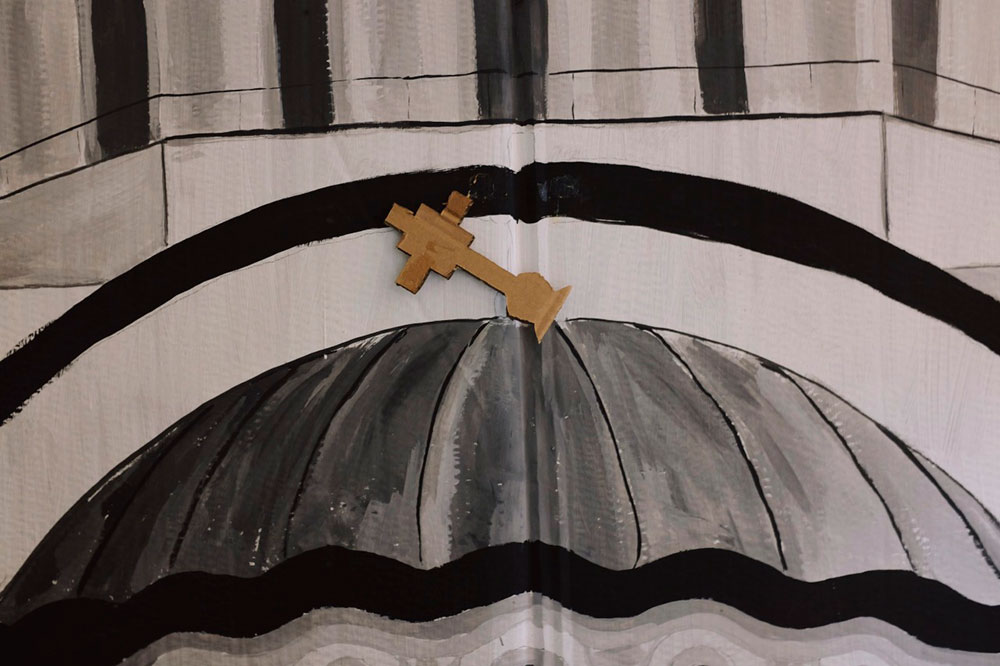
In the temple of St. Basil in Niksic, Bishop Metodije performed a memorial service for the Chetnik leader Draza Mihailovic and made it clear to everyone that love is indivisible. Namely, if you love and respect General Dragoljub Draza Mihailovic, as a collaborator of the occupier, a war criminal, and a fighter for the Serbian cause, then you must also love and respect current war criminals like Putin and hope for the victory of the aggressor Russia – because this is also a war for our Serbian cause. The memorial service was attended by the president of the municipality of Niksic and the Russian ambassador to Montenegro. Bishop Metodije delivered a sermon that even the Russian agitprop priests on the front in Zaporizhzhia would be proud of. “Well, this one is one hundred percent one of ours,” the Russian ambassador may have thought.
Russia is coming back to itself and it is “the hope for the whole freedom-loving world,” said the bishop, at a time when Russia is threatening ships exporting grain from Ukraine and destroying silos in Odessa with rockets, threatening African countries with famine. Metodije hopes that the time will come again when everyone will be allowed to do what they want – to destroy and kill, just like Russia. Therefore, to return to ourselves in this context is to surrender to the worst in us, because we are only ourselves when we are deep in sin. And when we return to ourselves completely – to Draza, Russia and the Serbian Orthodox Church – we will regain the freedom to destroy and kill like in the good old times. The Serbian bishop encourages the violation of God’s commandments and says that a “slandered war” is at work, quoting Crnjanski. It seems that the Russian aggression is very close to the Church’s heart, and the bishop warns that one should not listen to those who have no faith in Russia and condemn the war.
Russian Patriarch Kirill has stated that Russia is a barrier to the Antichrist, and Metodije recounted this: “In holy Russia there is hope for the salvation of not only the Orthodox peoples, but the whole of Europe and the world.” He also said that hatred towards Russia, Russian religion and tradition has allegedly lasted for centuries, but that he is personally convinced that “our children will live in a world that understands the importance of Russia.” However, “if there is no awareness of this, there will be no Russia, and, I’m afraid, no world that we love,” says Metodije and conveys the recent message of Dmitry Medvedev, who said that a nuclear apocalypse is not only possible, but quite probable. Medvedev said this in the context of the NATO summit in Vilnius, predicting the course of the war in Ukraine, but it is actually a repetition of standard threats coming from Russia. Bishop Metodije’s speech is completely in line with the statements of Russian church and political officials and with Russian propaganda.
Metodije’s statements are not the first of this kind in the Serbian Orthodox Church. They became more frequent since the beginning of Russian aggression. Some bishops openly support the aggression (Joanikije, Metodije, Irinej), and some do so covertly (like Porfirije). But why does the SOC count so much on Putin and Kirill in the first place? Nationalism and ressentiment for lost wars, which is routinely fueled in the regime media, and anti-Westernism, which has become a tradition, are only one part of the whole picture. Recently, however, statements against the Ecumenical Patriarch can also be heard, which was not the case before.
Bishop Gerasim, who is less known to the public, from the diocese of Upper Karlovac in Croatia and a member of the Synod of the Serbian Orthodox Church, gave a statement to a Russian blog about the recent meeting between the President of Ukraine Zelensky and Patriarch Bartholomew, which took place in the Ecumenical Patriarchate in Phanar in Istanbul. Gerasim said that this meeting announces the “rule of the Antichrist,” and that “Christ was expelled long ago from Phanar, as well as from the Vatican; he was not expelled by the Turks, but by the actions of godless and greedy patriarchs.” When you think about the contacts between Russia and Serbian bishops – Gerasim graduated from the spiritual academy in Moscow – all considerations disappear, causing the bishop from the majority Catholic Croatia to insult religious feelings of Catholic believers and accuse the Vatican of impiety and the Ecumenical Patriarchate of enthroning the Antichrist. But isn’t the Russian patriarch Kirill showing godless greed for Ukrainian land?
Bishop Gerasim’s statement indicates that the SOC’s alliance with the ROC and the Russian Federation can easily lead to open enmity with the Ecumenical Patriarchate. The main interests that bind the SOC to the ROC are the issue of canonical territory and autocephaly. Both churches were canonically defined in states that no longer exist. ROC within the USSR, while the SOC was created thanks to the creation of Yugoslavia. With the disappearance of those states, the only reasons the Ecumenical Patriarchate recognized the autocephalous status and extent of their canonical territory also disappeared. The Ecumenical Patriarchate is closer to the point of view that the borders of existing states should also determine the canonical borders of the churches – relations between Orthodox churches have mostly been regulated in this way throughout history – while the SOC and the ROC want to keep what they got from the Ecumenical Patriarchate based on the previous situation.
That’s why Bishop Gerasimus is having visions of the Antichrist and why Bishop Metodije is talking about the end of the world – because the Serbian bishops would rather see the whole world disappear than admit that they might be wrong about something.
Translated by Marijana Simic
Peščanik.net, 28.08.2023.


